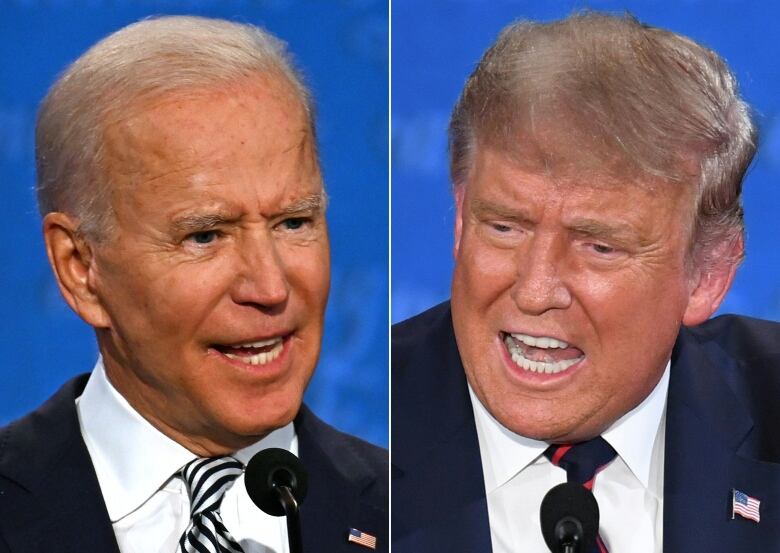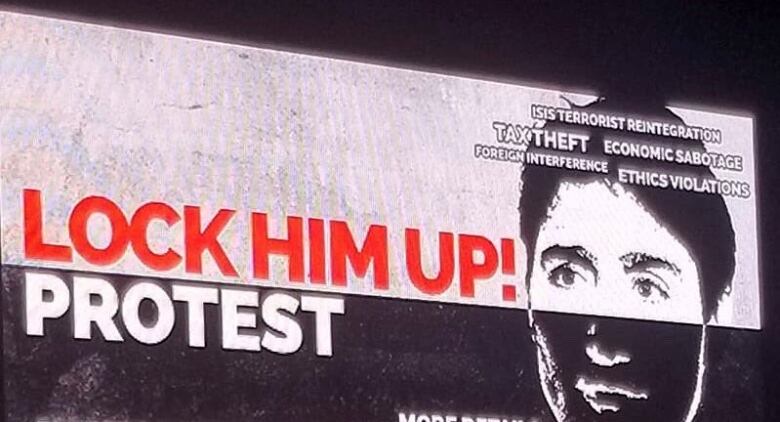How U.S. political advertising, social media strategy could shape Canada's next federal election campaigns
For a sign of what could be in store if there's an election call during the pandemic, look to the U.S.

This column is an opinionby ric Blais, president of Headspace Marketing in Toronto. Hehas helped build brands for more than 35 years and is a commentator on political marketing for media such as CBC's Power & Politics.For more information about CBC's Opinion section, please see theFAQ.
The day after a recent game of chicken in the House of Commons that could have brought down the government and sent Canadians to the polls, Elections Canada declared it was ready to run a snap election during a pandemic. However, are Canada's voters and politicians ready?
Besides being a risky political move, since many Canadians likely wouldn't be happy about political manoeuvring resulting in an election in the midst of a public-health crisis, there are big questions around how a physically distanced election would affect campaign strategy.
Political parties are in permanent campaign mode these days, and they have already taken steps to adapt to the health requirements of different regions through things such asincreased use of phone calls and online meetings. But that's no substitute for socially-close tactics that are mainstays of political campaigns: rallies, door-to-door canvassing, shaking hands and kissing babies.
If Canada ends up with a federalelection battle during the pandemic, the need to reach and engage voters, communicate party platforms and respond to attacks will likely lead to a significant increase in advertising spending. It could also mean the adoption of high-impact campaign strategies that push the limits of what's acceptable to media providers and the voting public.
For a sign of what Canadians could be in for if there's an election call in the coming months, look south of the border.

An analysis by the New York Times revealed that more than $1.5 billion US was spent on advertising for the presidential race alone from May 3 to Oct. 15; by contrast, $496 million was spent on ads around the presidential race by that point in the 2016 race. This astronomical increase in ad spending resulted in carpet-bombing of battleground states with, for example, close to 40 different ads for Joe Biden running in a single week in Pennsylvania alone.
Add to this the relentless micro-targeted ads on social media. Voters have never before been exposed to this much advertising from political parties during a campaign.
And it's mostly nasty.
The same analysis found that roughly 80 per cent of the Donald Trump campaign's ads have been either negative or what's called a "contrast ad," a mix of criticism of the opponent and self-promotion. Of those, 62 per cent were all-out attacks. About 60 per cent of Biden's campaign ads were negative or contrast, with 7 per cent outright negative.
Political strategists in Canada have generally refrained from adopting the more extreme U.S.-style political ads, but they have sought inspiration and guidance from top Democratic and Republican strategists. Leading up to the 2019election, for example, the Liberals got advice from Barack Obama's chief campaign strategist David Axelrod, who told them they needed to persuade voters they still represented change. Karl Rove, the architect of George W. Bush's two presidential victories, spoke at last year's Manning Networking Conference, where he advised Canada's most influential conservative thinkers, strategists and politicians to go beyond simplistic, bumper-sticker sloganeering.
All this suggests that election campaigning in Canada is increasingly being modelled after strategies in other countries. Here's a sampling of what we might expect should Canadian political strategists adopt advertising and social media tactics used in the U.S. to grab attention during the pandemic.
'Intentional wrongness persuasion'
That's what Scott Adams, the creator of Dilbert and author of the book Win Bigly, calls Donald Trump's persuasion method. First, make a claim that is directionally accurate but has a big exaggeration or factual error. Second, wait for people to notice the exaggeration or error and spend endless hours talking about how wrong it is.
As Adams puts it, "when you dedicate focus and energy to an idea, you remember it. And the things that have the most mental impact on you will irrationally seem as though they are high in priority, even if they are not."
Or as Jared Kushner told Bob Woodward for his book Rage, "controversy elevates the message."
Reductio ad absurdum
It's Latin for "reduction to absurdity," an argument whereby one seeks to prove one's position simply by pointing out the absurdity or foolishness of an opponent's position.
One of the most striking Biden ads doesn't offer any constructive information about his platform, it'sa 10-second clip posted on Twitter. It shows Trump speaking at a rally: "If I lose to him [Joe Biden], I don't know what I'm gonna do. I will never speak to you again. You'll never see me again." It ends with, "I'm Joe Biden and I approve this message." It's been viewed more than 18 million times.
Im Joe Biden and I approve this message. pic.twitter.com/TuRZXPE5xK
—@JoeBidenUntruths left unchecked
Many voters get their news from their social media feed, where they'll find a hodgepodge of lies, distortions and "alternate facts," to borrow from former Trump advisor Kellyanne Conway. Fact checkers and those seeking the truth can't keep up.
Participants in focus groups often say that the ads in particular must be true, because they would not be allowed if they weren't. That's generally the case, but there's one exception: political ads. Advertising Standards Canada vets most advertising, including government advertising, but not political ads during a campaign.
We didn't say it, they did
Third-party advertisers often say things candidates wouldn't dare say, and advertising from political action committees in the U.S. hashuge influence. Third-party ads have been taken to a new, highly sophisticated level by organizations like the Lincoln Project, a group of Republican operatives whodisavowed their own party in order to work against President Donald Trump.
In Canada, we've already had a taste of this. True North Strong & Free urged people to vote for the People's Party of Canada with billboards that read "Say No to Mass Immigration," while billboards by Alberta Fights Back called for the jailing of Prime Minister Justin Trudeau. The posters were eventually removed, but the decision to accept or refuse these ads lies with the media providers that must navigate delicate issues around free speech and censorship.

Unauthorized use
Using content in ads without permission or out of context can spell trouble for commercial advertisers, but those crafting political ads in the U.S. appear less concerned about this. The Trump campaign recently ran an ad featuring Dr. Fauci and took his words out of context, for example.
This has already started happening here. A Facebook post by a Conservative riding association in British Columbia in 2019 took an authentic quote from Canadian comedian Rick Mercer about the importance of voting, but changed the final part of the quote from "Vote" to "Vote Conservative." And the Liberals had to remove a campaign video from Facebook that featured Governor General Julie Payette.
Star power
Film star Samuel L. Jackson appeared in an ad for the Biden campaign slamming voter suppression. Sam Elliot and Brad Pitt lent their voices to ads portraying Biden as a uniter, while Martin Sheen voiced a Lincoln Project election day ad. And Taylor Swift and Bruce Springsteen lent their songs to ads urging Americans to vote and celebrating Biden's hometown roots.
Canadian celebrities tend to avoid politics, although Quebec's artistic community can be vocal in its support. Should political operatives in Canada seek star power to drive home their message, they should tread carefully as politics and celebrity culture usually don't mix well in this country.
Justin Trudeau predicted that the 2019 federal election would be the country's nastiest. It wasn't, at least from an advertising standpoint. As we watch how Americans have taken the political discourse to new lows, we should hope for Canadians' stereotypical niceness and politeness to kick in so we go high after they've gone low.
- This column is part of CBC's Opinion section. For more information about this section, please read ourFAQ.












_(720p).jpg)


 OFFICIAL HD MUSIC VIDEO.jpg)
.jpg)



























































































